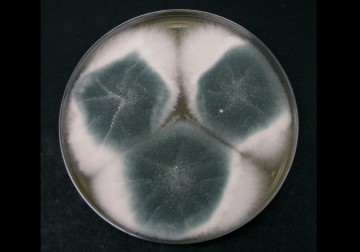In a pilot study from LVPEI, Drs. Amrita Mohanty, Bhupesh Bagga, and others assessed the efficacy of the antimicrobial drug fumagillin, either alone or in combination with other antimicrobials, in the treatment of microsporidial stromal keratitis.
The cornea, the front and outermost layer of the eye, is exposed to the elements, making it a target of various pathogens. Microsporidia, a group of spore-forming, fungus-like parasites, is known to infect the cornea, and that usually happens when the eye is exposed to contaminated water. In fact, the cornea is the second most common target of microsporidia after the gastrointestinal tract. If the infection is limited to the outer layer (epithelium) of the cornea, the resultant inflammation (keratitis) is largely self-resolving. However, if the spores manage to penetrate deeper into the stroma, the fibrous middle layer of the cornea, it triggers a more potent and sustained immune response, and the inflammation becomes sight-threatening—a rare condition known as microsporidial stromal keratitis (MSK).
MSK is a complex condition where inflammation can be disproportionate to infection. Sometimes, even a diffuse microsporidia presence can trigger unique variants of stromal inflammation. Treatments for MSK are also limited, with corneal transplantation (keratoplasty), an invasive surgery, being the only reliable option. Microsporidia exist in a zone between fungi and parasites and respond poorly to antiparasitic drugs. Some in vitro studies have shown that microsporidia can be susceptible to broad-spectrum antimicrobial agents, but the results observed in cell cultures did not translate well to a clinical setting. There is a need for a non-invasive alternative for treating this infection.
In a pilot study published in the journal Ocular Immunology and Inflammation, Drs. Amrita Mohanty, Bhupesh Bagga, and others from LVPEI assessed the efficacy of the antimicrobial drug fumagillin as a treatment for MSK. Fumagillin is an antibiotic derived from the fungus Aspergillus fumigatus and has demonstrated good antimicrobial activity against microsporidia in in vitro studies, making it a good candidate for exploring clinical efficacy. The study is a series of five cases (six eyes) with mild-moderate MSK. The researchers used 0.007% topical fumagillin, either alone or in combination with other antimicrobials—topical voriconazole, an antifungal drug, and oral albendazole, an antiparasitic medication.
MSK was resolved in all five patients after treatment with fumagillin over about 9 months, with no instances of recurrence over a follow-up period of about a year. These included two complex cases—one where the infection managed to perforate the cornea and another where the 74-year-old patient was also diagnosed with glaucoma and cataracts. In fact, after treatment, the patient was eventually able to undergo surgery for them. After treatment and follow-up, visual acuity improved to no vision impairment (VI) in one case (0.3 LogMAR), mild VI in two cases (0.5 LogMAR), and moderate VI in the remaining cases (0.7 LogMAR). In the absence of a ‘gold standard’ treatment for MSK, fumagillin eye drops show promise as a nonsurgical alternative to keratoplasty. The authors recommend more studies in the future to assess fumagillin's safety and the treatment’s long-term outcomes.
'Microsporidia infections are complex and an under-studied aspect of corneal infections. This pilot opens up the possibility of using fumagillin to treat this form of keratitis and thereby reduce the need for surgery. We are keen to see if these results will hold up over time,' says Dr Bhupesh Bagga, consultant ophthalmologist, and Head of the Ramoji Foundation for Corneal Infections at LVPEI.
Citation
Mohanty, A., Sharma, S., Gowtham, L., & Bagga, B. (2025). Role of Topical Fumagillin 0.007% in the Management of Microsporidial Stromal Keratitis: Interventional Pilot Study with Literature Review. Ocular Immunology and Inflammation, 1–5. Advance online publication. https://doi.org/10.1080/09273948.2025.2501028
Photo credit: Aspergillus fumigatus on Agar, Dr David Midgley, CC BY 2.5.



